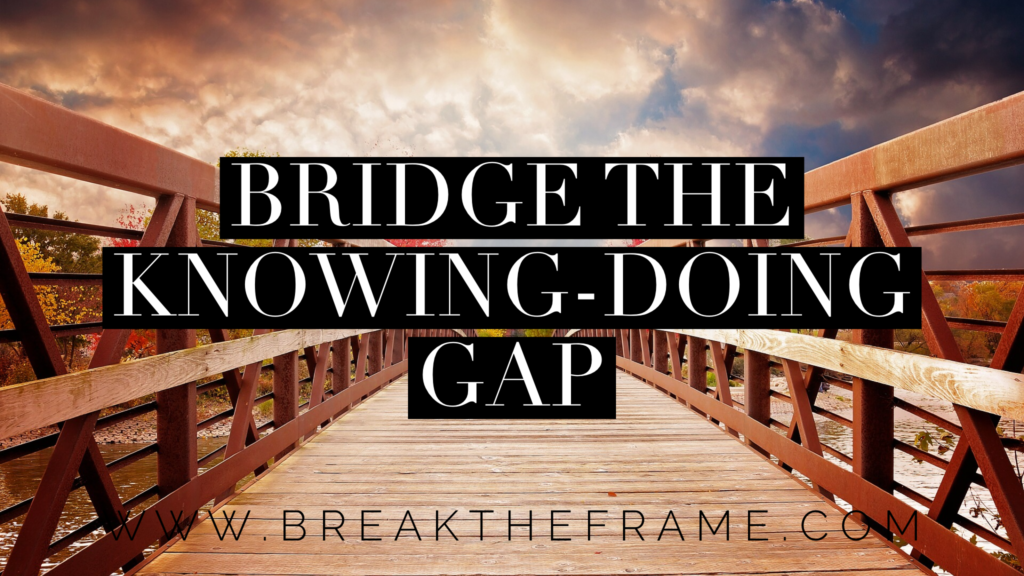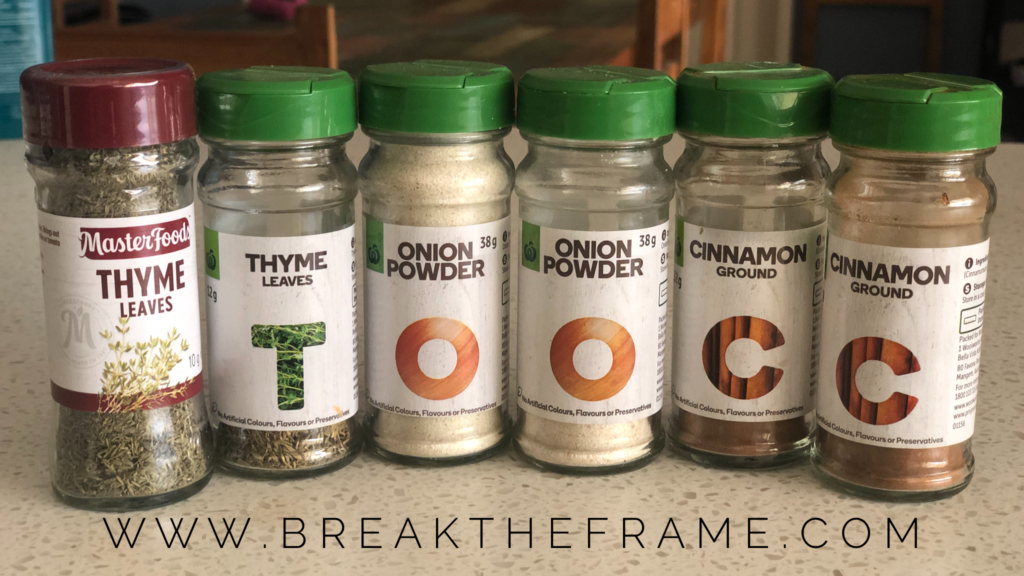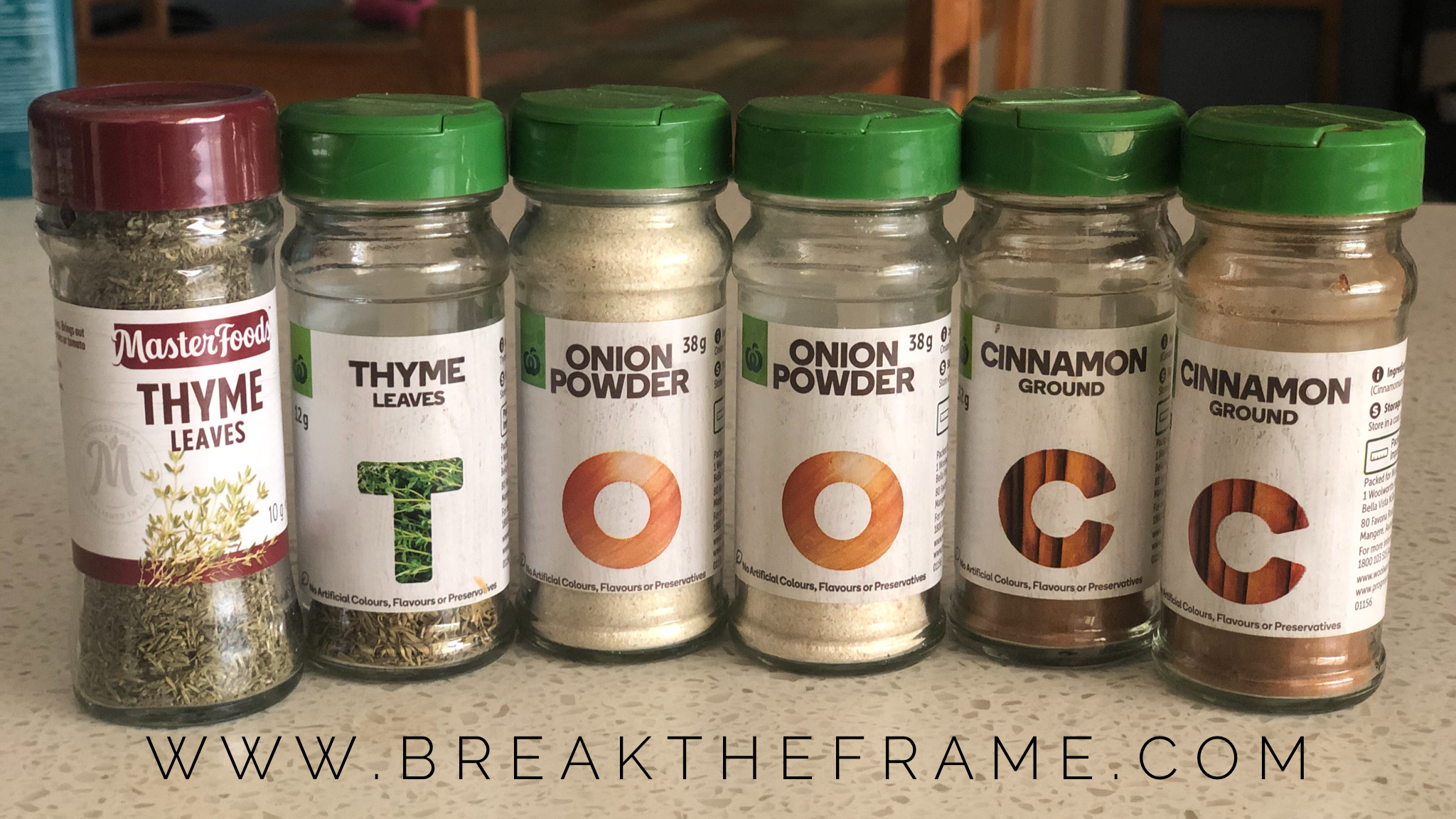
Far from one of those people who can throw together a MasterChef worthy meal from the pantry, I need a recipe. Over the past few months, more than a few have called for thyme. I’m not even sure what flavor thyme adds to the dish, to tell you the truth, but I keep buying it. Not to mention onion powder, cinnamon, and a few other spices I keep throwing into my cart.
Notice, I didn’t write, I keep adding it into the dish or keep using it, but I keep buying it.
I forget that more than enough thyme is in the pantry and assume my memory of what we have is an accurate representation of reality. It’s not.
Want to shake my shoulders and tell me the obvious thing to do? Check the pantry before I go shopping? Sure, I know that, but don’t do that. Knowing and doing are not always logically linked.
Think about it.
What do you KNOW yet DON’T DO?
- Keep calm?
- Eat healthier?
- Collaborate?
- Ask for help?
- Speak up?
- Go to sleep earlier?
- Exercise?
- Call a friend?
- Read?
- Close your computer?
- Meditate?
- Social distancing even around extending family and good friends?
The list is long. You know it but don’t do it, and you’re not alone. (And if you’re one of the few people who knows what to do, and you do it 100% of the time – good on you! You deserve some kudos.)
What if you’re tired of this rift between your knowing and doing? How can you make a change? Knowing isn’t enough. Does that mean I’m destined to buy multiples of spices until my house is overflowing? Of course not. It also doesn’t mean you can’t create change in your life too.

How do you bridge the knowing and doing gap?
I’m sick of buying thyme. It takes up space in my pantry. In life, it’s the guilt, sometimes shame, and negative self-talk that accompanies the promises made and broken to yourself. It all takes up mental space. So how do you stop? Simply, how do you do what you know you should do?
- Keep track of when you do the right thing and honor your inner knower.
- Catch yourself making bad choices. (This one is hard when so much of life is on autopilot)
- Ask for helpers. These are people who will gently remind you of what you know and want to do.
- Place post-its and reminders where you’ll see them.
- Use your planner.
- Have an accountability partner or outlet. Use whatever works best for you, whether it’s FB, spouse, or friend.
- Do it when you think about it instead of telling yourself I’ll get to it later. Excuses are the enemy of best-laid plans.
- Stop thinking about commitments to yourself as secondary to commitments you’ve made to others.
- Let the punishment fit the crime. I’m annoyed that I keep buying thyme, but I’m not going to spiral into self-hatred over it. Be kind to yourself, and give yourself space to do better.
- Use your to-do lists wisely. Instead of overflowing with tasks and to-dos, think about your must-dos. The key is to take a beat before getting on your hamster wheel.
- Carry a physical reminder with you. For example, I wear an Apple Watch. When I’m not moving, just seeing it on my wrist reminds me of what I know I should be doing.
- Make distractions hard. Most of the time, we have our phones no further than our fingertips. Create a routine where the phone can charge in a different space from where you want to do what you know you should do. (Meditation is challenging when every email bings on your device, no?)
- Get clear on what matters to you. Suppose it’s vital that you exercise, spend an hour writing daily, and cook dinner. You can plan for it instead of hoping it will magically happen.
- To close the knowing and doing gap, you have to make visible what you know. Spend some time with your journal, coach, or self-reflection tool to discover your inner knower.
- Allow for good days and bad days. If your only bar is perfection, you’re screwed.
- Go easy on the people around you who have a tough time bridging the knowing and doing gap too. Instead of being a master pesterer, punishing, or yelling, show some compassion. You can have a hard message and still deliver it in a caring way.
- Spend 5 minutes at the end of the day to try the 5-5-5 approach to journaling.
- Celebrate progress.
- Do the inner work to understand what’s stopping you from bridging the knowing-doing gap. Work with a coach, therapist, or other helping professional.
- Stop buying into your excuses – they won’t get you where you want to go.
When you want to make a change in your life, it’s not enough to know what to do. If it were, we’d all be rockstars at change. It’s a process that will have setbacks and successes. What works for you may not be what works for me. The trick is to figure out and commit to what you need to do.


Hi Alli,
to start, the title of this post is power in itself. “Bridging” … the word suggests action but not jumping off the bridge. So often when I feel “stuck”, I ask myself what can I do to get myself going on this. One step — any step — begins that journey. Sometimes the step I take has nothing to do — directly — with the goal. I start reflecting on the goal and sometimes I take a step that leads me to the bridge.
Love the post with its actionable suggestions and its very admission that everybody needs a little step to bridge the gap.
Will share,
Kate
Thanks, Kate. I often write about and coach people on taking a leap. Leaps involve courage and faith but sometimes our leaps are mental hurdles. We can create bridges that help us get to where we want to go. Bridges we cross one step after another. It’s interesting that we know what to do, like crossing at a crosswalk, but how often do we jaywalk and chalk it up to expediency? We do things contrary to what we know we should be doing. Sometimes that’s on the way to our dreams and goals and in other cases it a part of daily life. Bridges help us build the connections to live a congruent life, in line with our values and aspirations.
Thanks,
Alli
When we know the difference between knowing and doing, consider the difference between thinking and acting, and figure things in instead of out, change is more likely. Wanting to make a change isn’t sufficient. We have to commit, feel the need and then, do it. And, like you said in # 1, keep track and register your progress and success. It’s reinforcing!
What I love about what you wrote is “figure things in instead of out.” It’s true, wanting to change or do what we know to do isn’t enough.
Appreciate you and your insights, Gary.
Alli
Taking action instead of just knowing what to do involves courage and thoughtful planning. I know that during this difficult time I am often stumped on how to proceed. I know I need to step out of my comfort zone but my head holds me back. What I have learned is that by planning out how I will move forward to be outside more I am most successful. I do need to make some leaps.
Thanks Alli!
Courage is key. It’s also choosing the oftentimes more difficult path over the most expedient or the one that gives us an instant perk as opposed to taking the long road to deeper satisfaction. I always appreciate your stories and experiences. I think a lot of people will relate to knowing what they need to do and their heads also holding them back.
Thank you!
Alli